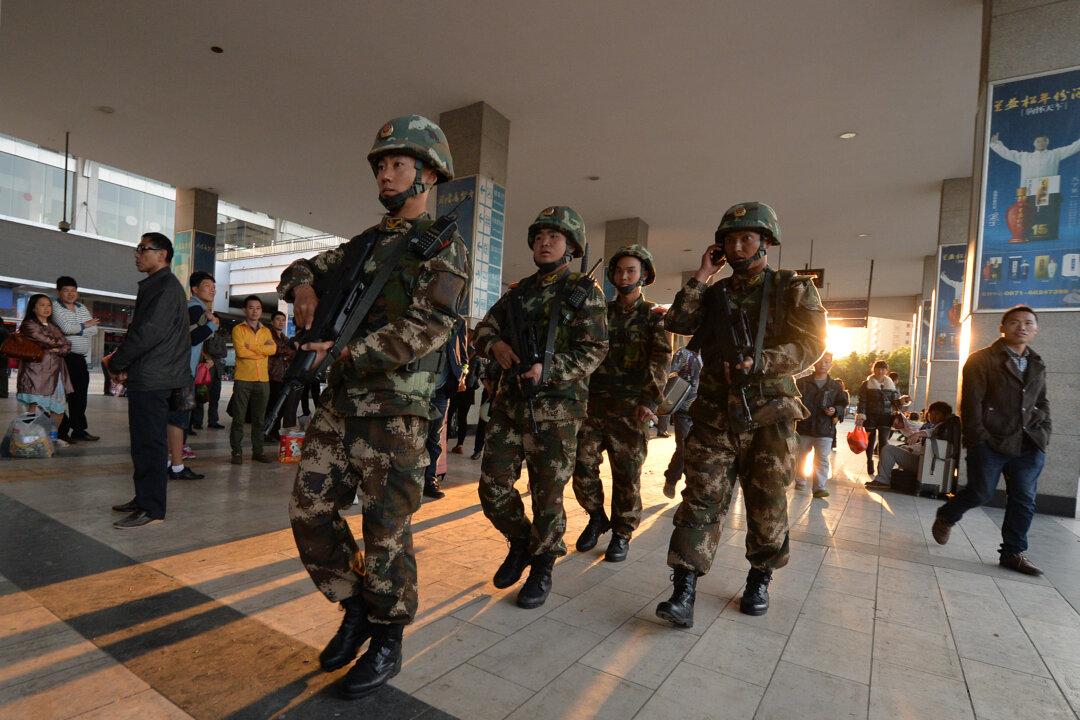Some members of the Chinese public have stepped forward to speak out against the rough tactics police are using against people from Xinjiang, in the wake of savage killings at a train station in the south of China that was blamed on separatists from the Xinjiang Uyghur Autonomous Region.
After eight people armed with knives stabbed and killed 29 people and injured over 140 on March 1, the Chinese propaganda authorities said it was a terrorist attack organized by “Xinjiang separatist forces.” Xinjiang is home to the Turkic-speaking Uyghur minority, who are muslim.
After the incident police stepped up their inspections on people identified as Uyghur, raiding houses, asking for residential permits, and demanding that people from Xinjiang “report immediately” when moving or staying in new residences.
Inspections
“If you see Xinjiang people living here, running business, or traveling and so on, immediately report it to the Xianhu police station,” went one announcement issued by a police station on March 2, in Nanning City of Guangxi Province, neighboring Yunnan, where the incident took place.
Similar announcements were issued in other cities. A printed police station announcement issued on March 4 in Xining City, the capital of western China’s Qinghai Province, was posted on Twitter.
It said: “From today, all the house owners in the district who are from Xinjiang, Uygurs, or Tibetans must come to the police station to register.”
The demand that brought heated discussion on the Internet. Many Chinese thought it was discriminatory and demanded an explanation.
One young Uygur man named Ablet was forced to move out of a rental residence in Dali City of Yunnan Province on March 2, due to his Uygur identity, according to a Dali netizen on Weibo, a Twitter-like platform in China.
The police had sought to punish the landlord for not reporting Ablet as a Uyghur, and assisted the landlord in ejecting him.
The post soon focused media and public attention on the discrimination, which resulted in Ablet receiving an apology from the local police.
Not All Terrorists
The intense reporting of the attack in Kunming by the Chinese press, which regularly used terms like “Xinjiang separatists terrorist attack” in headlines, along with the identification of the attackers as “people from Xinjiang” and “Uygurs,” raised hatred and panic against Uyghurs as an ethnic group, many in China say.
Anecdotes abound online of regular Xinjiang residents being refused stay in hotel or being able to get a ride in a taxi. A stream of posts on Chinese social media has drawn attention to the incidents.
Many Chinese showed their sympathy to Uyghurs in general, urging the authorities not to stir up ethnic hatred.
Actress Tong Liya , herself a Uygur, remarked: “Violent terrorists don’t represent any ethnic group. Please don’t transfer the anger for terrorists to an ethnic group or a region.”
Wang Jingchun, also an actor, wrote: “I was born and grew up in Xinjiang. To be fair, Xinjiang people are truly warm, hearty, and hospitable.”
Questioning the Narrative
International Uygur groups have raised questions about the Chinese regime’s quick conclusion on the identity of the attackers, and how they then moved to shut down independent reporting on it. They also demanded to know why Chinese Internet censors deleted reports and pictures about the incident.
Some experts said that the rapid conclusion was convenient for the official line.
“Violent incidents related to Xinjiang can be used by the Communist Party to build consensus in the community,” said Wen Zhao, a senior commentator on Chinese affairs based in Toronto, in a written exchange. “The Party wants to make Chinese people acknowledge that without them in power, the nation would be split, people’s safety would not be protected, and ‘terrorists’ would run rampant.”
Ethnic turmoil in Xinjiang, which activists argue is a result of the Party’s colonialist approach to governance in the region, has thus sprung up.
“The Party has failed in governing Xinjiang, and can’t find a way out. So it found an enemy to put the responsibility onto,” said Heng He, a political analyst with New Tang Dynasty Television. “The Party can now use the attack as an excuse for, or to support, its violent crackdown. Nationalism is always easy to incite and take advantage of.”




